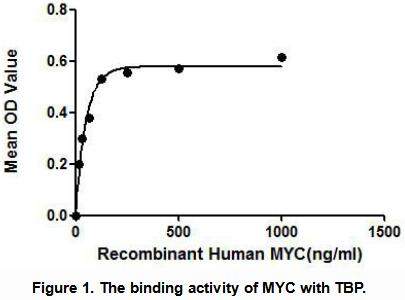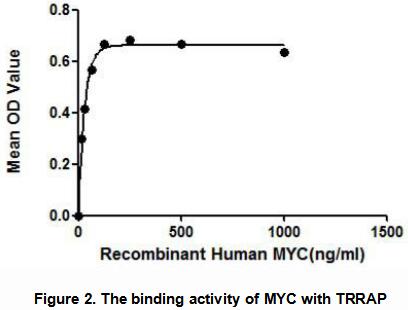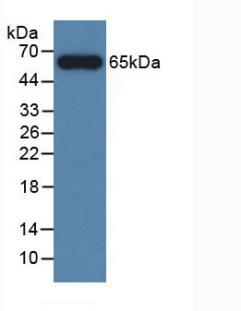Active V-Myc Myelocytomatosis Viral Oncogene Homolog (MYC)
C-Myc; BHLHE39; Myc Proto-Oncogene Protein; VMyc Class E basic helix-loop-helix protein 39; Transcription factor p64; Proto-oncogene c-Myc
- Product No.APB290Hu01
- Organism SpeciesHomo sapiens (Human) Same name, Different species.
- Buffer FormulationPBS, pH7.4, containing 0.01% SKL, 5% Trehalose.
- Traits Freeze-dried powder
- Purity> 97%
- Isoelectric Point6.6
- ApplicationsCell culture; Activity Assays.
- DownloadInstruction Manual
- UOM 10µg50µg 200µg 1mg 5mg
- FOB
US$ 320
US$ 800
US$ 1600
US$ 4800
US$ 12000
For more details, please contact local distributors!
ACTIVITY TEST


MYC (Myc proto-oncogene protein) is a nuclear phosphoprotein that binds specific sequence of DNA. MYC functions as a transcription factor and regulates transcription of target genes. It has been proven that c-Myc protein is intracellularly associated with TBP (TATA-binding protein) of the TFIID transcription initiation complex; besides, TRRAP (Transformation/transcription domain-associated protein) is thought to be an essential cofactor for the MYC. Thus a binding ELISA assay was conducted to detect the interaction of MYC with TBP and TRRAP. Briefly, recombinant human MYC were diluted serially in PBS, with 0.01%BSA (pH 7.4). Duplicate samples of 100uL were then transferred to TBP-coated and TRRAP microtiter wells and incubated for 2h at 37°C. Wells were washed with PBST and incubated for 1h with anti-MYC pAb, then aspirated and washed 3 times. After incubation with HRP labelled secondary antibody, wells were aspirated and washed 3 times. With the addition of substrate solution, wells were incubated 15-25 minutes at 37°C. Finally, add 50µL stop solution to the wells and read at 450nm immediately. The binding activity of MYC with TBP and TRRAP was shown in Figure 1 and Figure 2 separately, and this effect was in a dose dependent manner.
USAGE
Reconstitute in 10mM PBS (pH7.4) to a concentration of 0.1-1.0 mg/mL. Do not vortex.
STORAGE
Avoid repeated freeze/thaw cycles. Store at 2-8°C for one month. Aliquot and store at -80°C for 12 months.
STABILITY
The thermal stability is described by the loss rate. The loss rate was determined by accelerated thermal degradation test, that is, incubate the protein at 37°C for 48h, and no obvious degradation and precipitation were observed. The loss rate is less than 5% within the expiration date under appropriate storage condition.
GIVEAWAYS
INCREMENT SERVICES
-
 BCA Protein Quantification Kit
BCA Protein Quantification Kit
-
 Molecular Mass Marker for Protein
Molecular Mass Marker for Protein
-
 Monoclonal Antibody Customized Service
Monoclonal Antibody Customized Service
-
 Polyclonal Antibody Customized Service
Polyclonal Antibody Customized Service
-
 Protein Activity Test Experiment Service
Protein Activity Test Experiment Service
-
 Electrophoretic Mobility Shift Assay (EMSA) Experiment Service
Electrophoretic Mobility Shift Assay (EMSA) Experiment Service
-
 Buffer
Buffer
-
 Lentivirus Packaging Experiment Service
Lentivirus Packaging Experiment Service
-
 Adenovirus Packaging Experiment Service
Adenovirus Packaging Experiment Service
-
 Real Time PCR Experimental Service
Real Time PCR Experimental Service
-
 Spike RBD Protein (S-RBD)
Spike RBD Protein (S-RBD)
-
 Protein G
Protein G
-
 Protein A
Protein A









